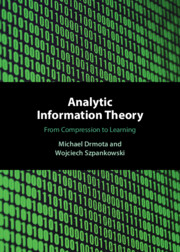Refine search
Actions for selected content:
6829 results in Communications and signal processing
Part IV - Techniques
-
- Book:
- Quantum Theory
- Published online:
- 06 October 2023
- Print publication:
- 31 August 2023, pp 439-566
-
- Chapter
- Export citation
10 - Quantum–Classical Correspondence
- from Part II - The Principles of Quantum Theory
-
- Book:
- Quantum Theory
- Published online:
- 06 October 2023
- Print publication:
- 31 August 2023, pp 248-270
-
- Chapter
- Export citation
Index
-
- Book:
- Quantum Theory
- Published online:
- 06 October 2023
- Print publication:
- 31 August 2023, pp 659-662
-
- Chapter
- Export citation

Analytic Information Theory
- From Compression to Learning
-
- Published online:
- 24 August 2023
- Print publication:
- 07 September 2023
11 - Integer Coding
-
- Book:
- Pearls of Algorithm Engineering
- Published online:
- 08 June 2023
- Print publication:
- 22 June 2023, pp 194-209
-
- Chapter
- Export citation
4 - List Ranking
-
- Book:
- Pearls of Algorithm Engineering
- Published online:
- 08 June 2023
- Print publication:
- 22 June 2023, pp 32-43
-
- Chapter
- Export citation
2 - A Warm-up
-
- Book:
- Pearls of Algorithm Engineering
- Published online:
- 08 June 2023
- Print publication:
- 22 June 2023, pp 10-22
-
- Chapter
- Export citation
1 - Introduction
-
- Book:
- Pearls of Algorithm Engineering
- Published online:
- 08 June 2023
- Print publication:
- 22 June 2023, pp 1-9
-
- Chapter
- Export citation
13 - Dictionary-Based Compressors
-
- Book:
- Pearls of Algorithm Engineering
- Published online:
- 08 June 2023
- Print publication:
- 22 June 2023, pp 240-251
-
- Chapter
- Export citation
Preface
-
- Book:
- Pearls of Algorithm Engineering
- Published online:
- 08 June 2023
- Print publication:
- 22 June 2023, pp xi-xii
-
- Chapter
- Export citation
8 - The Dictionary Problem
-
- Book:
- Pearls of Algorithm Engineering
- Published online:
- 08 June 2023
- Print publication:
- 22 June 2023, pp 96-127
-
- Chapter
- Export citation
Frontmatter
-
- Book:
- Pearls of Algorithm Engineering
- Published online:
- 08 June 2023
- Print publication:
- 22 June 2023, pp i-iv
-
- Chapter
- Export citation
3 - Random Sampling
-
- Book:
- Pearls of Algorithm Engineering
- Published online:
- 08 June 2023
- Print publication:
- 22 June 2023, pp 23-31
-
- Chapter
- Export citation
Contents
-
- Book:
- Pearls of Algorithm Engineering
- Published online:
- 08 June 2023
- Print publication:
- 22 June 2023, pp vii-x
-
- Chapter
- Export citation
6 - Set Intersection
-
- Book:
- Pearls of Algorithm Engineering
- Published online:
- 08 June 2023
- Print publication:
- 22 June 2023, pp 72-81
-
- Chapter
- Export citation
14 - Block-Sorting Compression
-
- Book:
- Pearls of Algorithm Engineering
- Published online:
- 08 June 2023
- Print publication:
- 22 June 2023, pp 252-273
-
- Chapter
- Export citation
12 - Statistical Coding
-
- Book:
- Pearls of Algorithm Engineering
- Published online:
- 08 June 2023
- Print publication:
- 22 June 2023, pp 210-239
-
- Chapter
- Export citation
5 - Sorting Atomic Items
-
- Book:
- Pearls of Algorithm Engineering
- Published online:
- 08 June 2023
- Print publication:
- 22 June 2023, pp 44-71
-
- Chapter
- Export citation
7 - Sorting Strings
-
- Book:
- Pearls of Algorithm Engineering
- Published online:
- 08 June 2023
- Print publication:
- 22 June 2023, pp 82-95
-
- Chapter
- Export citation
Index
-
- Book:
- Pearls of Algorithm Engineering
- Published online:
- 08 June 2023
- Print publication:
- 22 June 2023, pp 302-306
-
- Chapter
- Export citation
